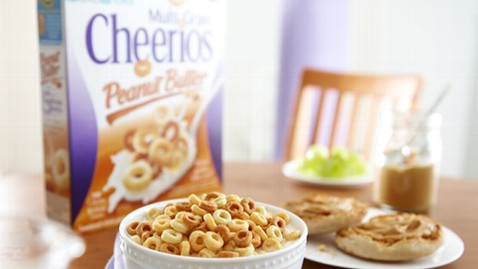New Peanut Butter Cheerios Worry Parents of Allergic Kids

(General Mills)
Jodi Loftis, of Albuquerque, N.M., already warns her daughter of certain candies and granola bars that may contain peanut ingredients. Now she can add another food to her watch list: Cheerios.
General Mills has recently introduced Multi Grain Cheerios Peanut Butter cereal, which the manufacturer touts as allowing consumers to "(i)ndulge in real peanut butter taste without derailing your diet."
But Loftis and other parents with children who have peanut allergies worry that the new product could, in fact, derail their kids' peanut-free diets if playmates share their snacks with them.
"Even as a 9 year-old, you can continue to tell her everyday, every week, make sure you don't share any foods with anybody," Loftis said, "but sometimes it's hard for a 9 year-old to remember that."
Other parents have voiced concerns of cross-contamination at facilities manufacturing both traditional Cheerios, a long-favored snack among toddlers, and peanut butter cheerios.
In a statement, General Mills said the company could say with "complete confidence" that Multi Grain Cheerios Peanut Butter will not cross-contaminate other Cheerios varieties.
"General Mills employs the most stringent allergen control practices in the industry," the company said.
The Cheerios fears come on the heels of the death last week of a Virginia first grader who suffered an allergic reaction during recess. Her mother told reporters she had a peanut allergy. Police reported today that she had received a peanut from another student who was unaware of her allergy.
Pennsylvania mom and allergy safety advocate Gina Clowes said the girl's death may be making parents extra anxious about the new Cheerios.
"Parents are very very scared. It just brings to light the reality of food allergies," said Gina Clowes, who runs the online support group AllergyMoms.com and chairs the national advocacy committee of the Food Allergy Initiative.
Clowes said that within the last two weeks, she's heard from some 60 parents worried about the new Cheerios. Nicole Smith, a Colorado mom and the founder of the site AllergicChild.com, said one woman left her a Facebook message saying her husband accidentally bought the peanut butter Cheerios cereal for their couple's allergic son.
"Thank goodness I notice(d) before we opened them," the woman wrote.
General Mills defended its packaging of Multi Grain Cheerios Peanut Butter in its statement.
"The food industry and the allergen-sensitive community have worked together diligently to educate consumers that allergens are best identified on product labeling. That's why we've made it a top priority to ensure that our packaging and labeling clearly communicate what's inside the box," the company said.
Clowes said what would make parents more comfortable with the new product is if the peanut butter Cheerios themselves were somehow made to look more different than plain Cheerios, but that's an idea General Mills rejects.
"Altering the product's appearance… would not be an effective way to distinguish allergens," the company said.
Clowes said parents were also looking for more specifics on how the company prevents cross-contamination.
"They (General Mills) have excellent reputation as an allergy aware company," Clowes said. But, she added, "we're nervous."
A General Mills spokesman said that the company cannot disclose the details of its manufacturing operations for "competitive reasons."
Dr. Wesley Burks, a leading expert in food allergens at the University of North Carolina at Chapel Hill, said that while parents should take precautions to ensure their children don't eat foods they're allergic to, it's important to note that life-threatening allergic reactions don't happen as a result of smelling, touching or being in the same room with the food in question.
"For a child to have truly life-threatening, life-ending reaction, they have to ingest the food," he said. The idea that other forms of food contact could lead to death, Burks said, is a common misconception among parents.
Burks said that peanut allergies and other food allergies are on the rise but the reasons behind the trends are unclear.
For more information on allergies, visit the ABC News OnCall+ Allergies Center.